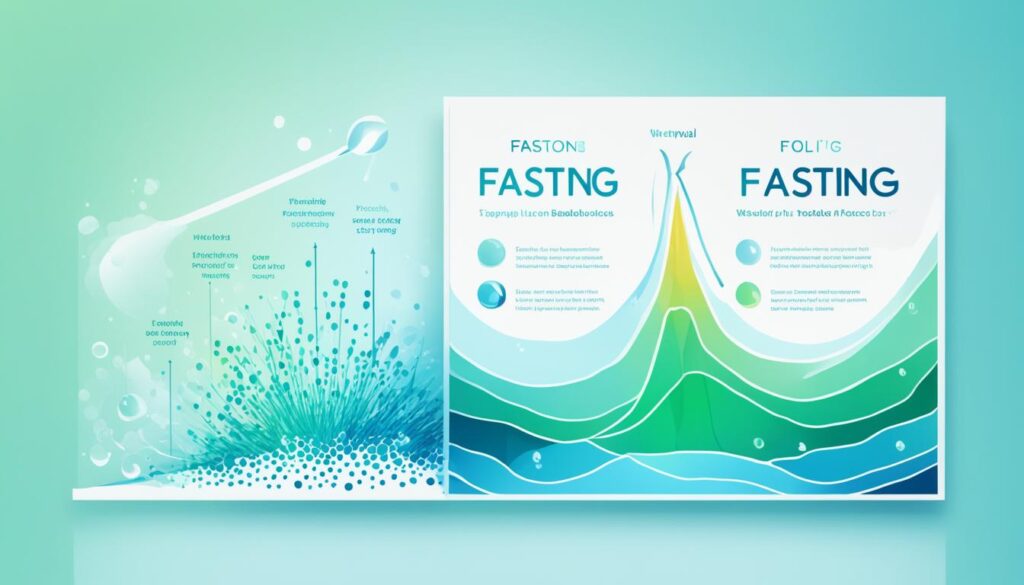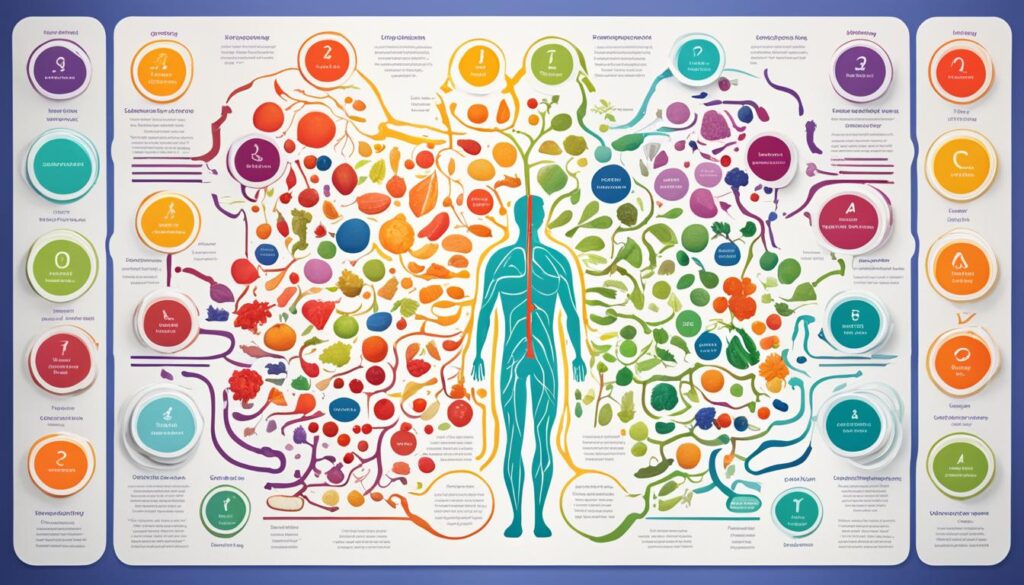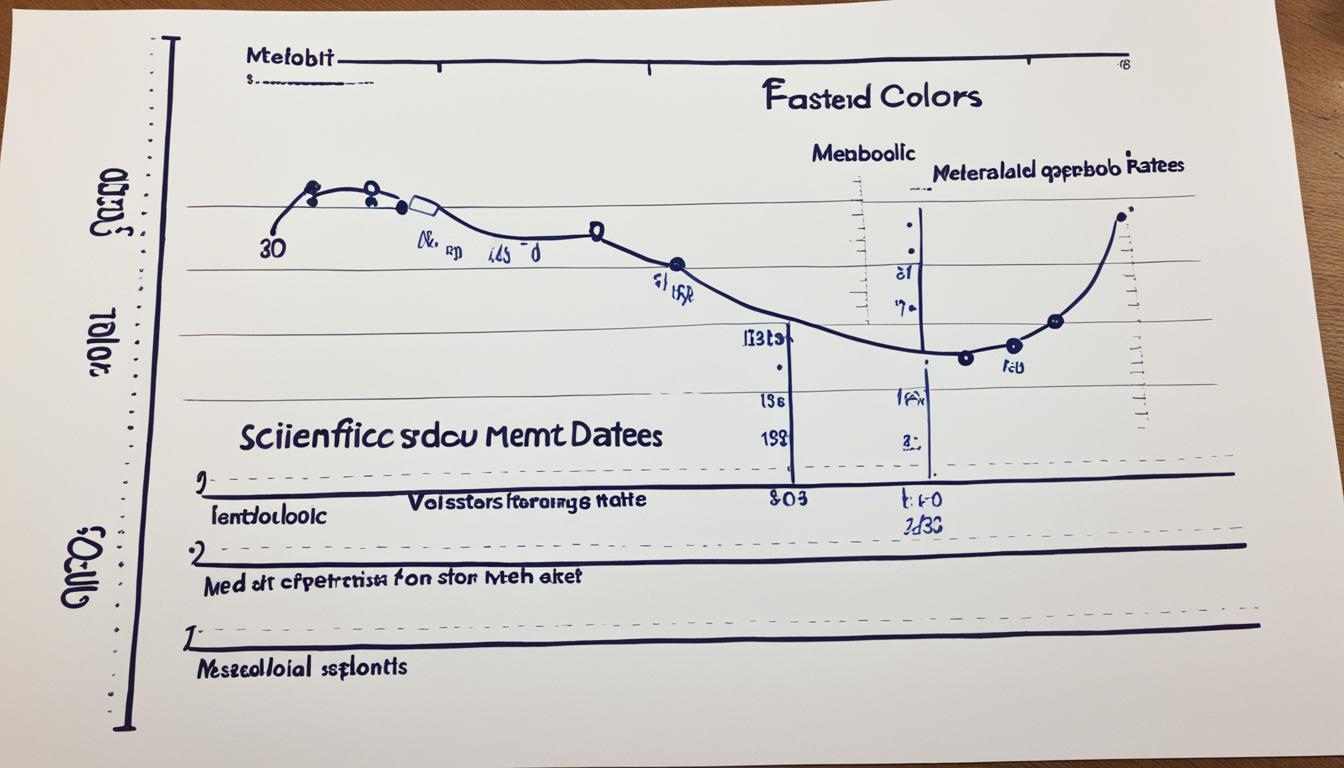Many people look for ways to improve their metabolic health. They often focus on what they eat. Water fasting and its effects on metabolism are getting a lot of attention. Studies show it might be more than just a trend.
Fasting can change the body in big ways. It could help with weight loss and improve metabolic health. Research shows our bodies can adapt when we don’t eat. This could change how we think about losing weight and staying healthy.
Key Takeaways
- Water fasting is typically a short-term dietary intervention lasting between one to three days.
- Scientific studies highlight significant metabolic shifts and health changes even after short durations of fasting.
- Despite potential benefits, water fasting carries risks, such as adverse side effects and temporary health improvements.
- Intermittent fasting and time-restricted eating are emerging as potentially safer alternatives with promising health benefits.
- Understanding the balance between fat mass and lean mass loss during fasting is crucial for assessing its overall efficacy.
- Research continues to unfold, offering deeper insights into how fasting influences metabolic pathways and overall health.
- The ongoing Big IF Study aims to unravel the long-term impacts of intermittent fasting on a large scale.
The Evolution of Water Fasting in Human History
The history of fasting is deep and complex, woven into human evolution. It’s not just a new diet trend but a key part of survival and spiritual expression for centuries.
The Origin of Fasting and Its Historical Significance
Fasting dates back to when food was scarce. Our ancestors had to go without food sometimes. Before farming started around 10,000 BC, early humans often fasted. This helped them survive and adapt.
Many ancient cultures made fasting a big part of their lives. They saw it as a way to purify the body and spirit. In ancient Egypt, Greece, and many other places, fasting was a key part of their traditions.
Cultural and Medical Uses of Fasting Through the Ages
Fasting was more than a spiritual or cultural act. It was also used for health reasons. Old records show it helped with arthritis, asthma, and diabetes.
It was also used to control blood sugar and help epilepsy patients. Studies from back then to now show its health benefits.
Today, even with modern medicine, fasting is back in the spotlight. Research now supports intermittent fasting for better insulin use and preventing chronic diseases like metabolic syndrome.
| Condition | Historical Fasting Use | Modern Research Correlation |
|---|---|---|
| Diabetes | Used to enhance insulin sensitivity | 2023 study shows a reduction in type 2 diabetes risk |
| Cardiovascular Diseases | Used to reduce heart disease risks traditionally | Alternate-day fasting lowers cholesterol and blood pressure |
| Epilepsy | Calms hyperactive neurons | Ongoing research backs fasting to manage seizure activities |
| Weight Management | Not directly noted | Studies indicate significant body fat reduction |
The history of fasting shows its long history and its growth from a basic survival method to a complex lifestyle choice with health benefits. As we learn more about these ancient practices, we see how old wisdom and new science can work together to show fasting’s many benefits.
Understanding the Biological Mechanics of Fasting
Fasting starts a complex set of biological changes that change how our bodies work. At the heart is the biological fasting mechanism, a key system that helps us survive when there’s no food. It’s not just about not eating; it’s about changing how we use energy and what we use for energy.
Energy Source Shift: From Glucose to Fat Stores
At first, fasting makes the body switch from using glucose to fat for energy. Normally, we use glucose from food, but fasting makes us turn to fat instead. This change helps us stay energized, lose weight, and work better. In the first few days, fasting makes us use fat more, which is key for fasting to work well.
The Role of Autophagy During Fasting
Fasting also starts autophagy, a process that helps fix and keep cells healthy. Autophagy benefits us by getting rid of old or damaged cell parts. This helps cells stay young and keeps us healthy. Studies show that fasting makes autophagy stronger, which helps prevent diseases and makes us live longer.
This shows how fasting changes our metabolism and helps our bodies work better overall.
| Metabolite | Change (Fold Increase) | Implication |
|---|---|---|
| Ergothioneine | Significant | Enhancement of antioxidants |
| Leucine, Isoleucine | 1.5 to 2.0 | Increased longevity indicators |
| Purine and Pyrimidine | 2.0 to 3.0 | Rise in protein synthesis and gene expression |
| Ophthalmic Acid | 1.5 to 2.5 | Anti-aging and health sustenance |
New cell parts are made during fasting, thanks to increased metabolites like purines and pyrimidines. This shows fasting helps cells renew themselves, thanks to autophagy benefits. Studies show fasting changes our metabolism and cell health in big ways, offering benefits beyond just weight loss.
Water Fasting and Its Effects on Metabolism: What Science Says
The talk about fasting and metabolism gets a boost from studies on water fasting. These studies show how fasting can change the body’s metabolic processes. This leads to big metabolic rate changes. People share stories and studies prove that fasting does more than help with weight loss. It changes the body in big ways.
Understanding how long you fast is key. Short fasts (24–72 hours) quickly lower triglycerides and blood pressure. This shows a fast change in how the body works. Longer fasts can bring even more benefits, depending on how your body reacts.
| Fasting Duration | Metabolic Benefits | Possible Risks |
|---|---|---|
| 24-72 hours | Lower triglycerides, modified blood pressure levels | Increased uric acid production |
| Extended periods (17+ days) | Sustained fat loss, largely recoverable lean mass loss post-refeeding | Heightened risk of gout attacks, potential for disordered eating behaviors |
| Intermittent Fasting (Varies) | Improved brain functions, memory, heart health, and physical performance | Requires diet strategy, possible adaptation period of 2-4 weeks |
Using fasting research in daily life can bring lasting health benefits. Making fasting fit your needs, like mixing it with intermittent fasting, can boost metabolic health. This approach helps with long-term wellness and can prevent diseases.
Modern Science Sheds Light on Age-Old Fasting Practices
Today, we know a lot more about how old fasting ways can help us now. We use studies on intermittent fasting and fasting-mimicking diets to make new ways to stay healthy. These new methods mix old fasting ways with today’s health needs.
Recent Studies and Their Impact on Fasting Guidelines
Recent studies show fasting is effective and can change how we eat today. Fasting-mimicking diets are key in making fasting easy to do every day. They don’t require the long fasts of old.
Guidelines for fasting are always changing. They talk about how fasting helps with metabolism and lowers disease risk. This shows we need to follow fasting with solid research and rules.
Fasting Mimicking Diets and Their Relation to Traditional Water Fasting
Fasting-mimicking diets are a gentler version of traditional fasting. They offer weight loss and better metabolic health without the strict fasting. This is great for people who find old fasting hard or not safe for them.

Let’s look at how traditional water fasting and fasting-mimicking diets compare:
| Criteria | Water Fasting | Fasting-Mimicking Diet |
|---|---|---|
| Duration | Varies (typically 1-30 days) | 5 days per cycle |
| Caloric Intake | Zero calories | Approx. 500-600 calories per day |
| Primary Benefits | Weight loss, detoxification, metabolic switch to fat burning | Weight control, metabolic health, reduced disease risk |
| Accessibility | High commitment, requires careful monitoring | Lower commitment, easier to integrate with lifestyle modifications |
Fasting-mimicking diets make it easier to use fasting in our lives today. They keep us connected to the old ways of fasting.
Analyzing the Impact of Fasting on Weight Management
Fasting, especially as intermittent fasting, is now a key strategy for managing weight. This part looks at how different fasting plans affect body weight. It covers both short-term and long-term effects.
Weight Loss Patterns in Short-Term vs. Long-Term Water Fasting
Short-term fasting, like the 16/8 method, involves eating for 8 hours and fasting for 16. This method helps cut down fat and boost metabolic health. Long-term fasting also leads to lasting fat loss and better insulin sensitivity and heart health. A study found people lost an average of 3.79 kg after fasting for a while, showing its effectiveness.
Lean Mass vs. Fat Mass Loss: Understanding the Difference
It’s important to know how fasting affects lean and fat mass differently. Short-term fasting quickly reduces weight, mainly from water and glycogen, before it starts to burn fat. Long-term fasting, however, keeps more lean mass while cutting down fat. Research shows that fasting can help lose fat without losing muscle, showing its effectiveness in targeting fat while preserving muscle.
In summary, fasting is a strong tool for managing weight. It balances short-term weight loss with long-term health gains. Whether through short fasts or longer periods, reducing calorie intake helps in losing fat and improving metabolic health over time.
Health Effects Beyond Weight: What Happens Inside Your Body
Fasting is not just about losing weight. It has many metabolic health effects that go beyond weight loss. These effects show how fasting changes our body in many ways, making it a powerful tool for health.
The Systemic Changes During Prolonged Fasting Periods
A study with 12 healthy people showed big changes during a seven-day fast. They lost an average of 5.7 kg right away. But the real changes were in their bodies, affecting many proteins in major organs.
These changes started to show after three days. It was like their whole body was reacting to not getting enough nutrients.

Protective Measures and Potential Health Periods During a Fast
One of the big changes was in proteins that help the brain work well. This shows fasting might protect our brains. It could even help prevent brain damage.
Fasting also helps with obesity, type-2 diabetes, and heart health. The good effects last even after the fast is over. People often keep losing fat and managing their weight well after fasting.
| Study Year | Focus | Outcome |
|---|---|---|
| 2017 | Cardioprotective Effects of Fasting | Weight Loss and Cardioprotection in Obese Adults |
| 2019 | Intermittent Fasting | Potential Benefits in Cardiovascular Disorders Treatment |
| 2018 | Low-Calorie Diets and Intermittent Fasting | Positive Impacts on Obesity and Type-2 Diabetes Treatment |
| 2016 | Zero-Calorie Alternate-Day Fasting | Comparison with Daily Caloric Restriction in Adults with Obesity |
| 2016 | Intermittent Fasting vs Continuous Energy Restriction | Effects on Glycaemic Control in Type 2 Diabetes |
Water Fasting Research: From Protein Levels to Genetic Insights
Fasting is a big deal in health research. It shows us how our bodies change and what happens at a molecular level. By looking at fasting protein levels and genetic insights, we’re learning how not eating affects our bodies. This knowledge helps us improve metabolic health.
The Role of Proteins During Fasting and Their Health Consequences
Studies now show how proteins play a big part during fasting. The liver starts making glucose and increases an enzyme that breaks down fat. This means our bodies switch from using carbs to fats for energy.
This switch helps us stay energized while fasting. It also affects how well our bodies use insulin and our metabolic rate.
Genetic Studies and Predicting Health Outcomes of Fasting
Fasting doesn’t just change our metabolism for a short time. It can also affect our health in the long run, say genetic studies. These studies show how fasting might prevent age-related diseases.
During fasting, some proteins that cause inflammation go down. At the same time, proteins that fix DNA go up. This could be why fasting helps us live longer and stay healthier.
| Fasting Duration | Changes in Protein Levels | Impact on Health Outcome |
|---|---|---|
| 24 Hours | Activation of Lipolysis and Gluconeogenesis | Improved Lipid Profiles & Glucose Management |
| 48 Hours | Increase in Ketogenic Activity | Enhanced Neuroprotection & Longevity |
| 7 Days | Significant Alterations in ECM Proteins, notably Tenascin-R | Reduced Risk of Chronic Disease onset |
This mix of research on fasting and genetics gives us a clear picture of fasting’s effects. It helps us make better diet plans for better health.
The Controversy: Weighing the Benefits Against the Risks
The debate over water fasting and its health benefits is complex and contentious. Many see fasting as a solution for metabolic issues, like obesity and diabetes. But, experts warn of the need for caution, considering each person’s health situation.
The Debate on Water Fasting Efficacy and Safety
Safety is a big concern in the fasting controversy. Studies show big differences in diet-related diseases across the U.S. This calls for careful and tailored fasting plans, especially for those at risk of heart disease or diabetes. Even though short periods of fasting can help with heart health, its long-term effects and metabolic risks are still being studied. The rise in processed and low-nutrient diets adds to the challenge of using fasting as a health solution.
Navigating the Risks: When Fasting Becomes Hazardous
The fasting safety debate highlights when fasting is not safe, like during pregnancy or for certain health conditions. Even stars like Beyonce report losing weight through fasting, but it’s not always safe. Research on fasting’s effects on health shows promise, but we need better screening tools to avoid risks for those with health issues.
Source Links
- Water Fasting: Weighing the Benefits and the Risks
- Water fasting’s metabolic benefits may be short-lived
- Exploring the effect of prolonged fasting on kynurenine pathway metabolites and stress markers in healthy male individuals – European Journal of Clinical Nutrition
- 8 Health Benefits of Fasting, Backed by Science
- The History of Fasting – Zero Longevity
- Fasting ramps up human metabolism, study shows
- Fasting boosts metabolism and fights aging
- Study identifies multi-organ response to seven days without food
- Water Fasting
- Intermittent Fasting: What is it, and how does it work?
- The One True Fast – Comparing Water-only Fasting, Intermittent Fasting and Fasting Mimicing Diets
- The Effects of Prolonged Water-Only Fasting and Refeeding on Markers of Cardiometabolic Risk
- Is Fasting Good For You? Here’s What The Science Says | ZOE
- The impact of a fasting mimicking diet on the metabolic health of a prospective cohort of patients with prostate cancer: a pilot implementation study – Prostate Cancer and Prostatic Diseases
- Frontiers | Effects of Intermittent Fasting in Human Compared to a Non-intervention Diet and Caloric Restriction: A Meta-Analysis of Randomized Controlled Trials
- Study identifies multi-organ response to seven days without food
- The Effect of Fasting on Human Metabolism and Psychological Health
- Physiology, Fasting – StatPearls – NCBI Bookshelf
- Human molecular adaptations to fasting: Insights from proteomic analysis
- Intermittent Fasting and Metabolic Health
- Is Fasting Healthy?
- Intermittent fasting: the science of going without




